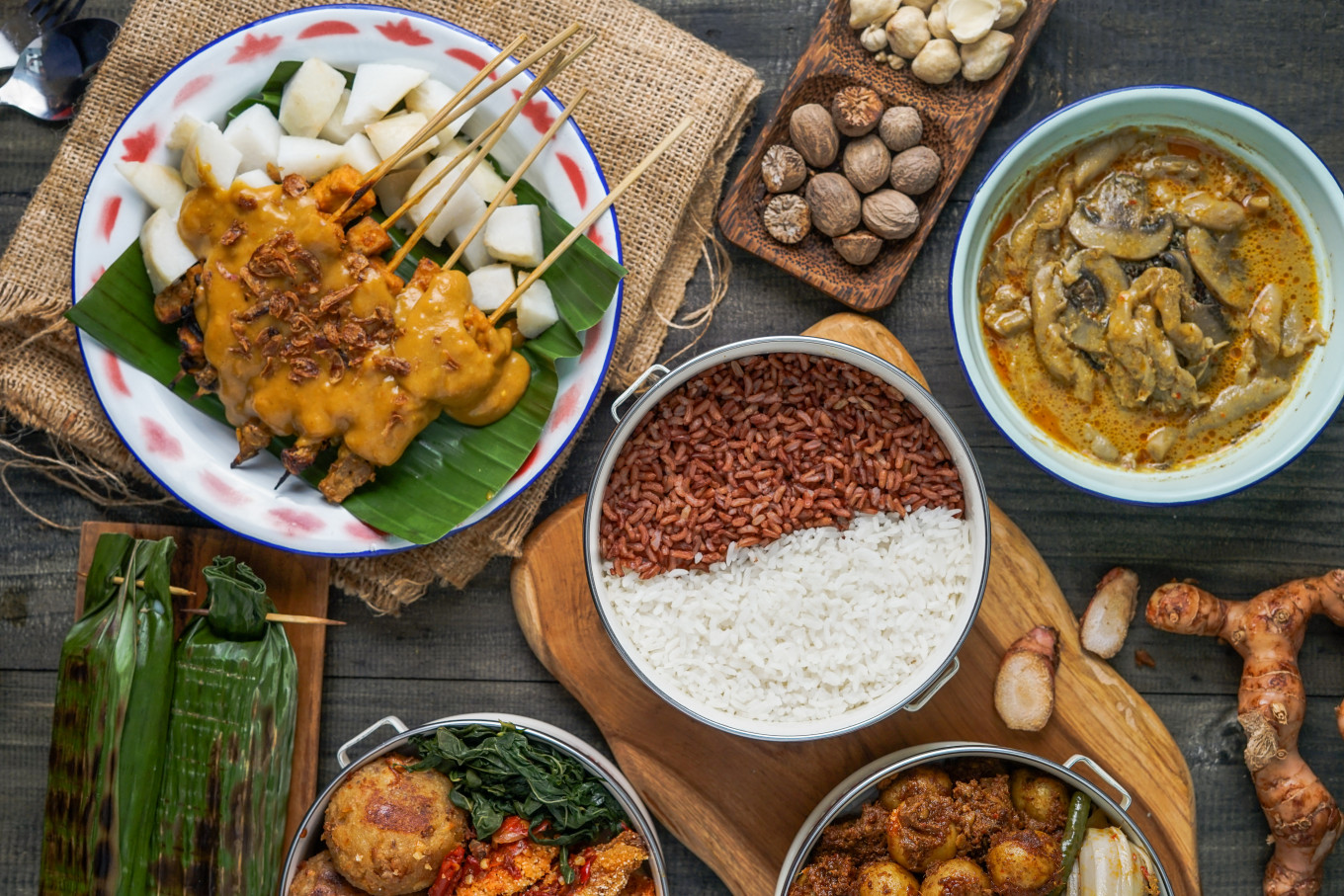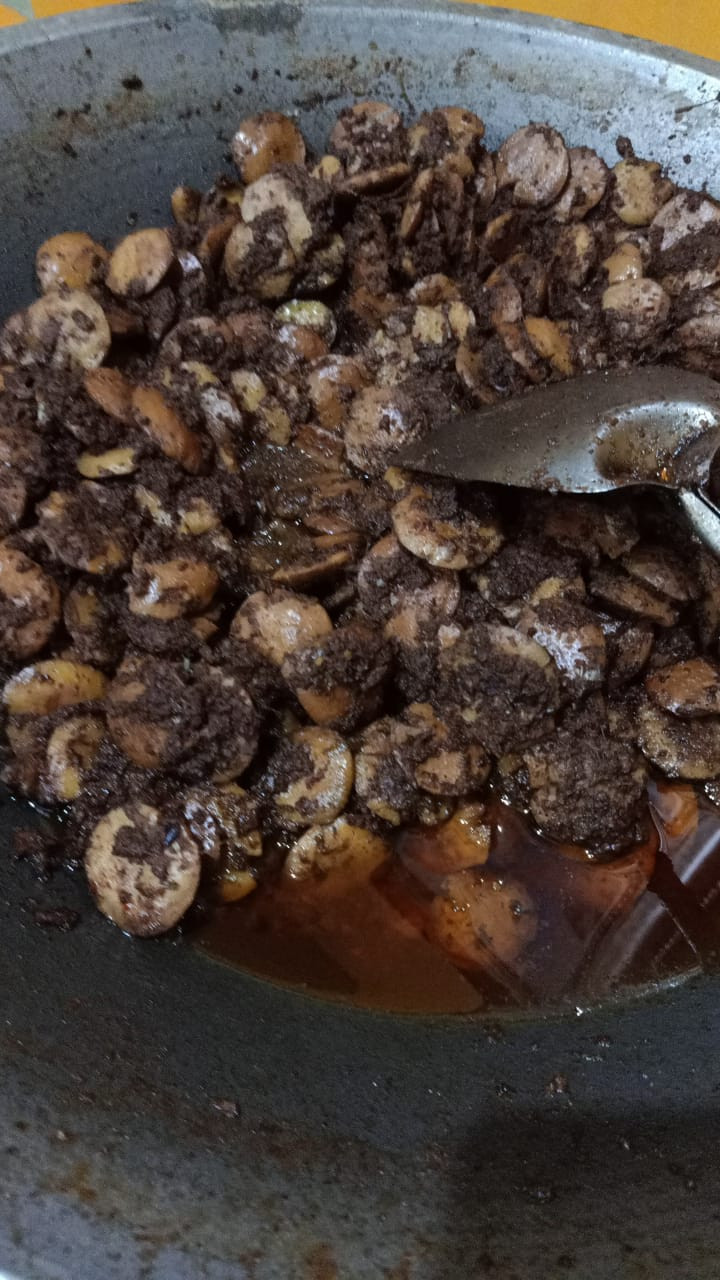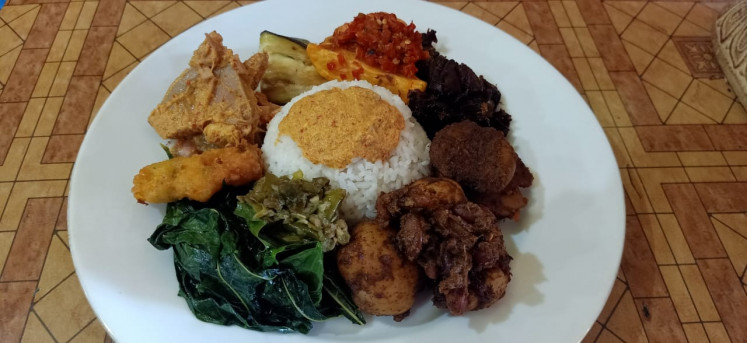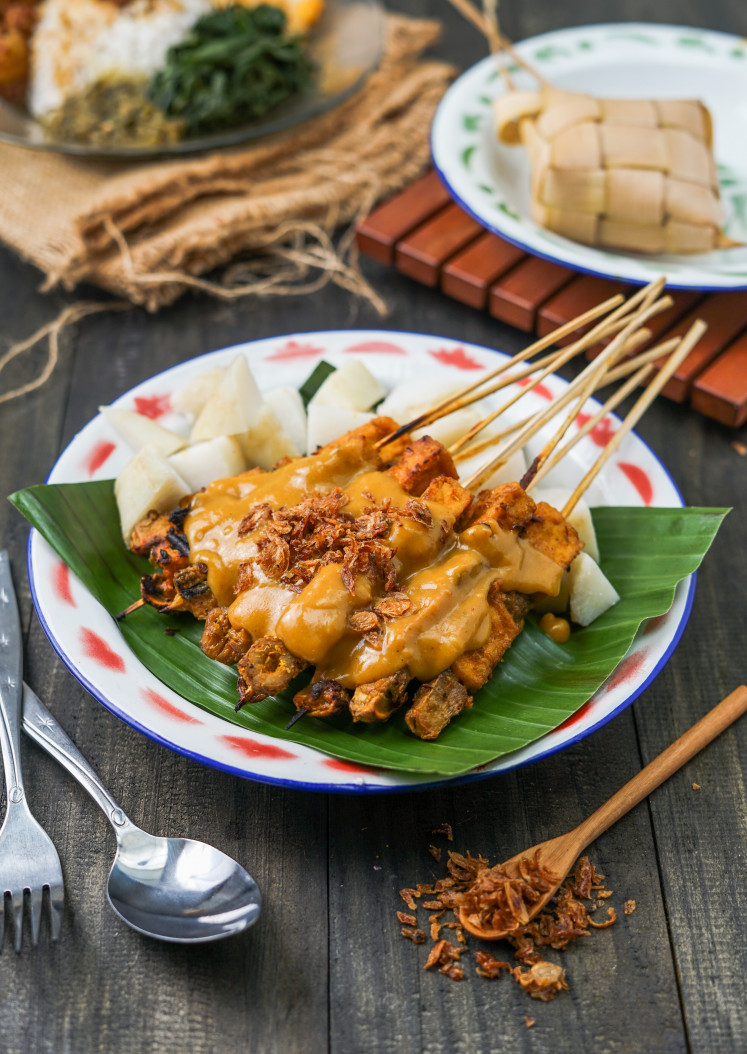Popular Reads
Top Results
Can't find what you're looking for?
View all search resultsPopular Reads
Top Results
Can't find what you're looking for?
View all search resultsPadang vegan restaurants: 'Blasphemy' or a better option?
Loved by many, Padang food is known for its rich taste with the use of coconut milk and chili paste among other spices. While traditionally use meat and animal products - especially cattle meat products and even offal - some restaurant owners decide to recreate Minang dishes by offering the vegan version.
Change text size
Gift Premium Articles
to Anyone
L
oved by many, Padang food is known for its rich taste with the use of coconut milk and chili paste among other spices. While traditionally use meat and animal products - especially cattle meat products and even offal - some restaurant owners decide to recreate Minang dishes by offering the vegan version.
At a glance, the Padang diner run by 30-year-old Yulmi Hari Fandi looks just like any other Padang food establishment. First-timers – especially locals – might be curious about the restaurant’s decorations, which include a Buddha statue, a Ganesh idol, and other religious symbols. It was interesting because most Minangkabau people who run Padang food eateries are usually Muslims.
An assortment of Minang dishes was displayed in the restaurant window, from rendang to balado – just like other Padang restaurants. These dishes, however, were far from typical Padang cuisine.
Yulmi Hari Fandi, 30, who hails from Solok, West Sumatra, faced criticism from his family after becoming vegan and opening a Padang vegan diner in Bali in 2017. (JP/Amahl S. Azwar)
Yulmi Hari Fandi, who prefers to be called Hari, does not use any meat or animal derivatives when cooking the restaurant’s dishes. He opened Warung Padang Vegan (Vegan Padang Diner) in 2017 to help people who favored plant-based food have more options when eating out or ordering food.
In addition to being well-known for its main ingredients, namely coconut milk and spicy chili, Padang cuisine is famous for its use of beef, chicken, poultry and even offal or organs. A vegan himself since 2016, Hari, who is from Solok, West Sumatra, was determined that he would only serve plant-based Padang dishes.
“I just want to help people to become healthy,” said Hari told The Jakarta Post in an interview at his restaurant on Jl. Teuku Umar in West Denpasar, Bali.
Take rendang for example. The world-famous dish is traditionally identifiable for its chunks of beef stewed with coconut milk and chili. While there are other varieties of rendang – including jackfruit rendang, this dish is mostly known for using meat or poultry as the main ingredients.
Hari’s array of rendang included jackfruit rendang, potato rendang and rendang jengkol (dogfruit rendang). Hari’s restaurant also serves jengkol cooked with spicy chili sauce or jengkol balado.
While jengkol is notorious for its bad smell, both dogfruit rendang and balado are popular menu items at the restaurant. Hari said rendang jengkol was especially popular among foreigners.
“There is this French lady who loves our rendang jengkol so much. Every time she shows up here and the dish is finished, she becomes full of ennui,” said Hari.
From time to time, Warung Padang Vegan is visited by people unaware of the plant-based food – despite the big sign in front of the restaurant. Hari would patiently explain to them about the dishes that they served.
“Occasionally, I have to even spell it out: no meat, no milk and no eggs,” he said.
One time, a customer questioned whether the vegan version of the Padang dishes could be just as tasty as the regular ones. Hari simply told the customer that he could leave the restaurant without paying if he did not find the food delicious.
“He ended up clearing his plate – and paid,” said Hari, who used mushroom broth and coconut milk as main ingredients for his dishes - among others.
When Hari decided to open a vegan Padang restaurant, he received criticism from his parents and extended Minang relatives. For them, eliminating meat and animal products from Padang food would make Hari’s restaurant less popular and, as a result, would not be profitable.
Hari, who became vegan in 2016, said that he did not open the restaurant for profit. Instead, the restaurant became his way of helping others – including animals. He admitted that growing up in a Padang family made it difficult for him when he started being a vegan.
“My parents asked me: why becoming vegan? Animals are created to be consumed, they said. But I thought: animals also need to live,” he said.
He admitted the criticism from Padang people toward him being a vegan went beyond one’s diet.
“They basically likened being vegan with believing in other religions [than Islam],” he said.
The experience prompted Hari to decorate his restaurant with symbols from all religions: Buddhism, Hindu, Christianity, and others.
From time to time, Hari would welcome women wearing hijabs and asked them whether they knew that they entered a vegan restaurant.
“They said: ‘Yes, we know.’ This shows that there are Muslims who become vegans,” he said.
Vegan style: A different kind of Padang: Warung Padang Vegan's menu. (JP/Courtesy of Warung Padang Vegan)Separately, Irene Umar, 36, who runs Loka Padang, a Padang vegan restaurant in Jakarta, said the establishment did face criticism from Minang people in particular – telling them that they are not being respectful.
“I invited them to sit down and have a taste themselves,” said Irene via WhatsApp, adding that most of the time the people who criticized Loka Padang ended up appreciating the food.
Officially opened in 2019, Loka Padang is now available at Sudirman Park and Grand Indonesia in Central Jakarta as well as food delivery service apps.
While branding themselves as Padang vegan restaurant, Irene said that many of her customers were not vegan.
“They [simply] find [Padang vegan dishes] surprisingly delicious, light, and guilt-free,” said Irene.
Choices
“It’s blasphemy,” said Tria Meirina Mulyasari, 35, an office worker based in Jakarta, when asked about her opinion on Padang vegan cuisine. She recalled that her boss brought two boxes of Nasi Padang vegan after coming back from a Padang vegan restaurant’s opening. For Tria, it would be the
first and the last time she ever tasted vegan Padang food.
“There’s a void in my gullet once I ate them. An emptiness. Because I feel like I’ve been lying to myself,” she said, laughing.
While admitting that there were Padang dishes that were traditionally plant-based, Tria still found the regular Padang dishes to be superior to the vegan ones.
Erwin, 35, who works in Tangerang, Banten, became vegetarian in 2002. He said that he liked Padang plant-based eateries because most vegetarian restaurants that he knew were focused on Chinese food.
“I like Padang vegan food because I like curry and spicy food,” he said, adding that his decision to stop eating meat was purely spiritual and not necessarily for health reasons.
Erwin himself believed that regular Nasi Padang (Minang-style rice with various side dishes) is too popular and the vegan version of it will never replace it.
“Each has its own segment,” he said.
Popular: Loka Padang's vegan take on Padang satay is one of their top menu items. The restaurant refuses to use fake meat in its ingredients and focuses solely on plant-based options. (JP/Courtesy of Loka Padang)Kate Walton, an Australian writer who lived in Indonesia from 2011 to 2019, said that while she was not vegan, she did try to eat plant-based food as much as possible.
“I think Padang-style vegan cooking is phenomenal. There are so many vegan or vegetarian choices. For example, the word 'rendang' actually refers to the style of cooking called 'merandang', so rendang can be made with jackfruit, mushrooms, eggplant, potatoes, cassava leaves and even fern tips,” she said, noting the versatility of Padang cuisine.
In the end, it’s all about choices.
Loka Padang’s Irene admitted that it would be “too far away” to expect the whole population to become vegan. For her, it is enough that people can now view vegan dishes as an option – just like when they choose Korean or Balinese restaurants.
“We respect everyone’s choices,” she said.
Tria agreed with Irene’s statement. While she would not put her mouth anywhere near Padang vegan food, Tria did not mind Padang vegan restaurants and people who chose to eat there.
“Padang vegan is OK, as long as I don't have to eat it,” she said.














